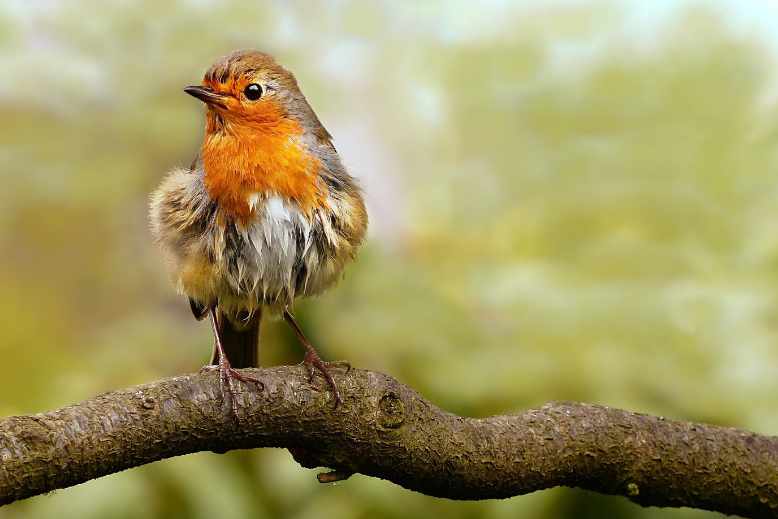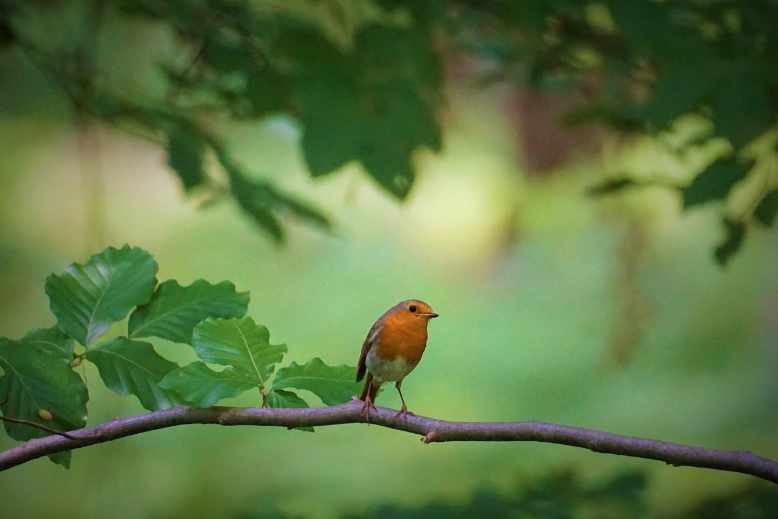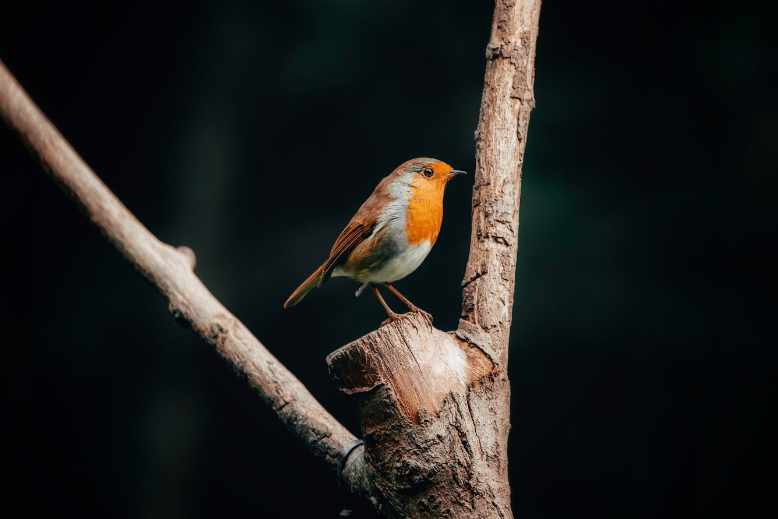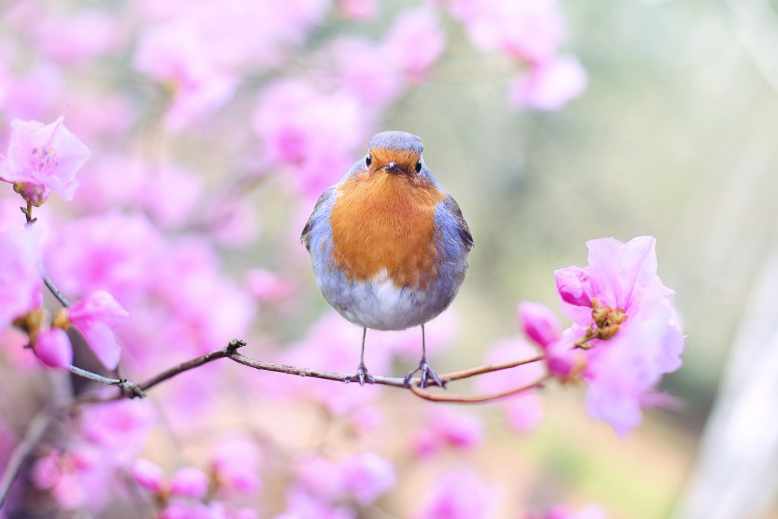Do Robins recognize humans? Yes. This friendly songbird can definitely recognize you by your schedule, body movements, and other signals, including your face. According to the research held by “Victoria University’s school of biological sciences,” robins can easily differentiate between people. They can identify their human friends by their faces and are perfectly capable of telling voices apart. Scientists believe that a robin’s different reactions to humans may be due to his individual behavioural type. Studies also highlighted that some birds, including pigeons and crows, can recognize faces and have hard feelings against humans. Plus, they do not hesitate to spread their opinions to other birdies.
Robins, no doubt, are amongst the highly admired Garden Birds. They seem to trust humans and don’t mind taking food from our hands. Nonetheless, do they really recognize us? If so, how? And what makes them follow some humans around? Is it a friendly gesture or something else that needs consideration?
Let’s find out together.

How do robins recognize humans?
Most robins recognize humans by their movements and schedules. They can also remember you by other possible signs, including your facial features.
How do they do that? Simple!
These early morning singers notice some people more than others and can recognize us as a part of memorizing different feed-related patterns, including when and where the food is. They are most likely to remember humans who regularly fill bird feeders with feed, have relaxed body postures, and dig in the dirt.
With a lifespan of around 19 years, these birds have plenty of time to learn more about you.
Why are robins always following me?
Robins get surprisingly close to the people they get herbivore vibes from. If a robin is following you, it means you aren’t acting like a predator, in his opinion.
In the wild, robins follow large mammals, including deer, wild bulls, and boars, to discover new ways to find food. When these huge animals move around, they disturb the soil, bringing insects and worms to the surface, making it easier for these little birds to dig for worms by moving debris, bushes, and leaves out of their way. In urban settings, robins mimic this attitude by following humans, benefiting from the freshly dug-up ground to find food.
It is important to note that robins don’t follow every human around. If you creep about them too much and act like a sneaky predator, your body will broadcast a threatening signal, making the birds wary of you.
Do robins like to be around people?
Being a friendly-natured bird, a robin never seems to feel uncomfortable around humans. Some robins even get used to pets that play in the backyard where the bird feeds and nests.
Even though robins don’t mind human presence and are often found on the ground, they are pretty fast and have a strong flight.
Do robins like humans?
Well, being a timberland edge species, these birds have always lived near people. So a good reason for their friendliness may be the fact that for the past 150 years, they have coexisted in Britain closer to us but have never been wronged. Contrary to that, robins are more reserved of humans in different regions, including France, where the tradition of hunting smaller birds lasted a little longer.
These birds have an ancestral behaviour of following different mammals around, taking advantage of the disturbance created by large feet, which loosens the ground and sends worms running. They have an inbuilt curiosity enabling them to seek different feeding opportunities. So it doesn’t take much for these birds to appreciate the presence of a human gardener sweeping leaves or tilling the soil, which flushes delicious food into view.

Do Robins Recognize Humans_ Related Questions.
- Is it rare to see two robins together?
To some extent, it is. Robins are highly territorial, and they don’t appreciate the presence of same-gender pals in their territory. Anyhow if you have just spotted two robins together, they are likely a couple of robins, one male, and one female robin. Female robins enter a male’s territory for breeding purposes only. The pair spends the entire season together and can involve 2 or 3 nestings.
- Are robins people-friendly?
The American robins are well known for their people-friendly nature. They are pretty comfortable around people and sometimes even get used to other pets.
- Are robins territorial/aggressive?
Robins are highly aggressive and incredibly territorial. They viciously attack other birds of their species and try to defend their territory, often till death.
Male Robins usually show their aggressiveness by singing at each other. They try to get on higher perches to show their breast more. These chirping combats can sometimes escalate to a fight resulting in injury or death of either participant.
Depending on the quality and size of the habitat, these birds occupy gardens alone. They select their territories based on nesting sites, food sources, and shelter. Male and female Robins live in separate territories until the breeding season is here. During this season, the territory is defended by an aggressive pair of robins.
- How long do robins live?
Sadly, the average lifespan of this tuneful bird is just 13 months due to the higher mortality rate in the first year. Once your friendly garden visitor passes this barrier, it stands a better chance of surviving for around 19 years.
- Why do robins sing so much?
The tuneful song of robins helps them attract a potential mate. However, it also helps these birds to defend their territory.
Robins have gained popularity as the 1st birds to start chirping at dawn. They are the last to stop twittering at night. Their songs are a “stay away from my territory” warning to other birds heading across the quiet skies in the evening.
- What does it means when robins come closer to you?
Many people across the globe consider robins as spiritual birds. They believe that a visit from these birds is actually a visit from their deceased loved ones. In some areas of the globe, robins represent life, new beginnings, fortune, and good luck.
- Do seeing a robin really brings good luck?
Well, as folklore believes, watching a robin is good luck. Many people have a strong faith that wishing on a robin can increase your fortune, and such wishes often come true. This bird is a prominent feature in French and British cultures and is widely viewed as a reminder of good times and Christmas.
- Do robins remember faces?
A bird’s ability to identify a potential friend or foe is key to his survival. And according to the latest research, some birds, including robins, are able to recognize and differentiate between human faces and voices.

- Can you feed robins by hand?
Despite their tiny size, robins are pretty plucky. This is evident from how close they get to humans working in the backyards. Their courage makes it easy to hand feed them by developing a trusting relationship.
Though robins are rather daring, giving these little birdies the confidence to eat right from your hand requires quiet, patience, and stillness.
- Are robins active at night?
In their natural habitat, Robins prefer to have some shut-eye at night. They find a resting spot where they can stay safe from predators.
Robins are amongst the first birds to start singing at dawn and the last ones to stop at night. They continue their chorus even during the freezing winters to defend their territory.
However, because they sing late till night, many people mistake them for nightingales. But this is far from the truth as robins are not nocturnal. Their night singing can be triggered by many factors such as loud noises, thunder, fireworks, sudden shaking of the tree in which they are resting, lights including floodlights, flashlights, and the list goes on.
Studies have shown that artificial lighting is a major cause for an increase in the nocturnal activities of these melodious Birds.
- How can one lure robins to his garden?
You can easily lure robins to your garden by providing them with feeding options. These birds will quickly learn to rely on you and are likely to visit you regularly.
Dig a patch of soil to give these birdies access to some fresh worms and insects. Turn this patch over regularly and lose the ground.
These birds will gladly pick their share of berries if you let them. They also feel great delight in eating unwanted bugs that risk your crops. Placing strawberries, blueberries, apples, grapes, watermelons, and raisins is also an acceptable way to attract these birdies to your garden.
The biggest challenge in attracting robins to your garden is the discovery phase. Robins don’t eat seed, and they are not accustomed to visiting bird feeders either. It may take them a while to figure out that there is food in your yard. Once they get the idea, they will keep visiting.
- What is robin’s favorite food?
These tuneful birds are not seed-eaters. You may notice them following you around as you dig your garden, hoping to munch on a few worms and bugs as you uncover them. Robins can also gulp down sunflower hearts, crushed peanuts, suet raisins, and seeds. Robins are big fans of bugs and mealworms, but they also don’t mind eating fruits and nuts in the wild.
- Do baby Robins stay with their parents?
No. Baby Robins rely on their parents for food and water supplies for two weeks. After that, they leave the nest and fledge on the ground. The fledging period usually consists of two or three weeks. During this period, the father or male robin feeds the hatchlings while the female robin incubates new eggs.

- Do male robins sit on the nest?
Male robins occasionally incubate their eggs. However, they mostly hang out in the territory throughout the day and immediately respond to their mate’s call. Some males are also seen bringing food to their females, but mostly females leave the nest to feed themselves.
- Can you tell a female Robin from a male Robin?
A male robin’s chest is usually covered with rust-coloured feathers. They have White outlines around their eyes, a yellow beak, a white throat, and a blackhead. Female Robins are pretty similar to their male counterparts in appearance, but their feathers are much lighter. A female robin’s feather almost gave a washed-out and faded look.
Male and female robins look almost identical.
- Do parents abandon baby robins?
No. It takes a lot of time and energy to build a nest. Thereby Robins are less likely to abandon their babies due to minor disturbance. Nonetheless, if you move the nest to a new place, parents may leave their eggs and possibly the young ones too!
- Do Robins mate for life?
No. These birds do not pair for life. A pair of robins usually stay together during the breeding season and produces 2-3 batches of hatchlings. They spend much of their time together when winter is mild.
- What are robins afraid of?
Robins are pretty brave fellows, but noisemakers such as wind spinners streamers, bright-coloured ribbons, and wind chimneys can scare them off. If you wish to scare this bird out of your yard, you can also opt for a high-tech solution such as sonic repellent.
- Why do robins have red breasts?
Most birds have bright colour feathers to attract potential mates, but that’s not the case with the robins. Robins have a red breast for a very different reason: to defend their territory.
Male robins recognize other males by their breast colour and then try to attack them. They are notorious for attacking red feathers and stuffed toys.
Male robins are unpredictable. They often live harmoniously alongside other species of birds, yet at times they attack them for no apparent reason. According to an estimate, around 10% of adult robins are killed by their own species each year. They are known for defending their territory with life, often losing this battle.
Final Words
Robins are intelligent and clever fellows. They do recognize our faces and are likely to befriend humans. Just show some respect for their space, and you will end up with a long-lasting garden visitor.




